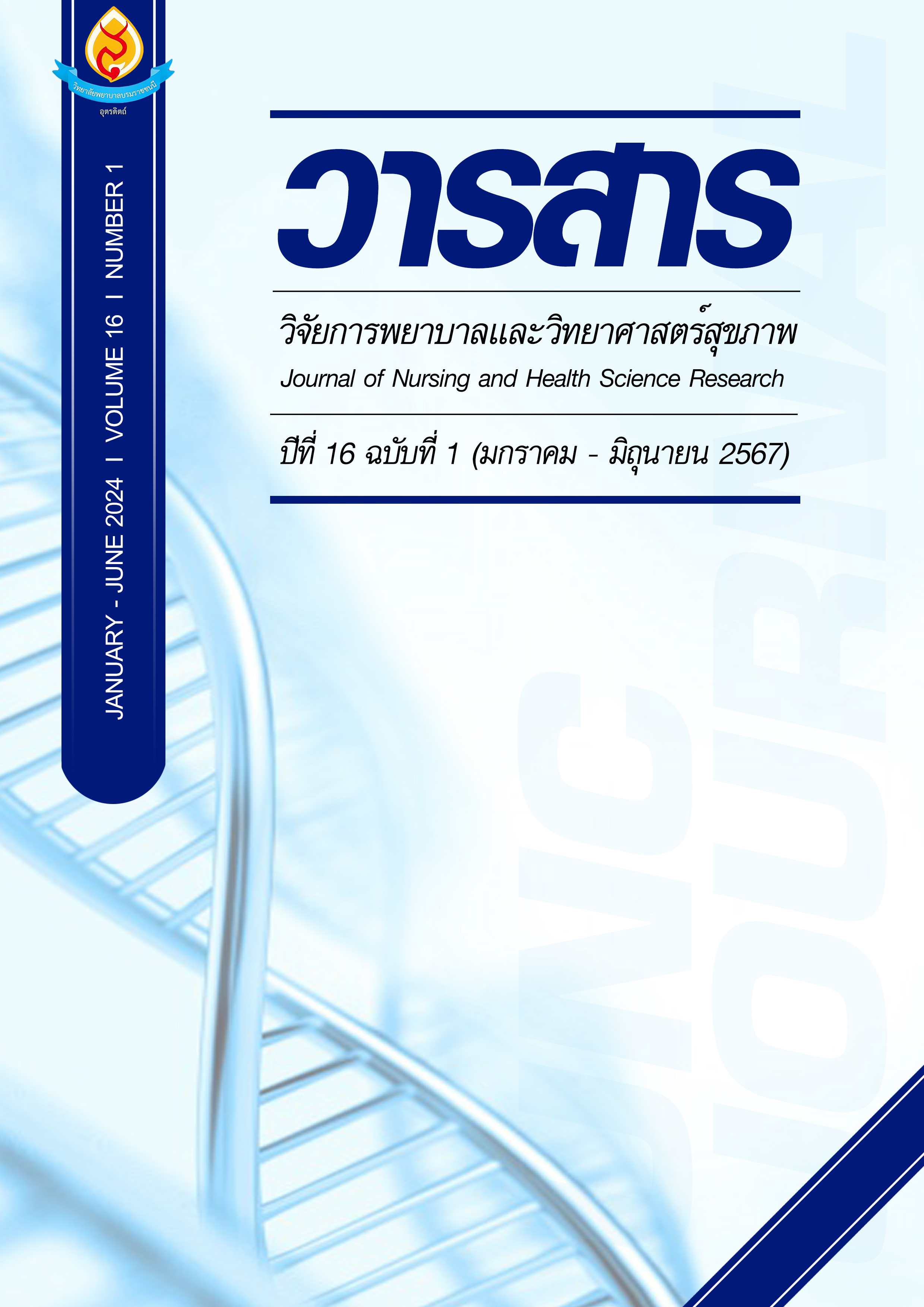มุมมองของผู้บริหารการพยาบาลต่อการเตรียมพยาบาลใหม่เข้าสู่ระบบบริการสุขภาพด้วยระบบพยาบาลพี่เลี้ยง: การวิจัยเชิงคุณภาพ
Main Article Content
บทคัดย่อ
การวิจัยเชิงคุณภาพแบบพรรณนานี้มีวัตถุประสงค์เพื่อศึกษามุมมองของผู้บริหารการพยาบาลเกี่ยวกับการเตรียมพยาบาลใหม่เพื่อเข้าสู่ระบบบริการสุขภาพด้วยระบบพยาบาลพี่เลี้ยงใน 3 ประเด็น คือ คุณลักษณะที่พึงประสงค์ของพยาบาลใหม่ ปัญหาและอุปสรรคในการพัฒนา และแนวทางการพัฒนาพยาบาลใหม่ด้วยระบบพยาบาลพี่เลี้ยง ผู้ให้ข้อมูล คือ ผู้บริหารการพยาบาลในโรงพยาบาลมหาวิทยาลัยแห่งหนึ่ง ในปี 2565 จำนวน 29 คน เก็บข้อมูลโดยการสนทนากลุ่ม วิเคราะห์ข้อมูลโดยวิธีวิเคราะห์เชิงเนื้อหา
ผลวิจัยพบว่าในมุมมองของผู้บริหารการพยาบาล คุณลักษณะที่พึงประสงค์ของพยาบาลใหม่หลังเข้ารับการเตรียมความพร้อมด้วยระบบพยาบาลพี่เลี้ยงในระยะเปลี่ยนผ่านสำหรับพยาบาลใหม่ มี 2 องค์ประกอบ ดังนี้ 1) มีความรู้และทักษะที่จำเป็นในการประกอบวิชาชีพพยาบาล ได้แก่ ความรู้และทักษะในคลินิก ความรู้และทักษะทางเทคโนโลยีและการใช้ข้อมูลสารสนเทศ 2) คุณลักษณะของการเป็นพยาบาลที่เป็นแบบอย่างแก่ผู้อื่น ได้แก่ การมีทัศนคติที่ดีต่อวิชาชีพพยาบาล และมีการเรียนรู้อย่างต่อเนื่อง ปัญหาอุปสรรคที่อาจทำให้การพัฒนาพยาบาลใหม่ด้วยระบบพยาบาลพี่เลี้ยงไม่บรรลุเป้าหมาย คือ ภาระงานในการดูแลผู้รับบริการที่มีจำนวนมากและความต่างระหว่างวัยของผู้นิเทศกับผู้รับการนิเทศการพยาบาล ส่วนแนวทางการพัฒนาพยาบาลใหม่ด้วยระบบพยาบาลพี่เลี้ยง มี 2 แนวทาง ดังนี้ คือ 1) การให้ความรู้เบื้องต้นเกี่ยวกับกฎระเบียบต่าง ๆ ในการทำงานและการฝึกทักษะที่จำเป็นในการทำงานโดยการหมุนเวียนในแผนกที่พยาบาลใหม่ปฏิบัติงาน และการฝึกทักษะการพยาบาลโดยพยาบาลอาวุโสคู่กับพยาบาลใหม่
ผู้วิจัยมีข้อเสนอแนะ ดังนี้ 1) นำคุณลักษณะที่พึงประสงค์ของพยาบาลใหม่ไปเป็นเป้าหมายในโปรแกรมการพัฒนาพยาบาลใหม่โดยมีกิจกรรมที่สามารถพัฒนาทั้งความรู้ ทักษะและบุคลิกลักษณะของพยาบาลใหม่ 2) ทบทวนรูปแบบการพัฒนาทักษะที่จำเป็นในการปฏิบัติงานของพยาบาลใหม่ เช่น รูปแบบการนิเทศทางการพยาบาลที่สามารถลดช่องว่างระหว่างวัยที่อาจเกิดขึ้นระหว่างผู้นิเทศและผู้รับการนิเทศทางการพยาบาล เป็นต้น
Article Details

อนุญาตภายใต้เงื่อนไข Creative Commons Attribution-NonCommercial-NoDerivatives 4.0 International License.
บทความหรือข้อคิดเห็นใดใดที่ปรากฏในวารสารวิจัยการพยาบาลและวิทยาศาสตร์สุขภาพ เป็นวรรณกรรมของผู้เขียน ซึ่งบรรณาธิการหรือสมาคมศิษย์เก่า ไม่จำเป็นต้องเห็นด้วย และบทความที่ได้รับการตีพิมพ์เผยแพร่ถือเป็นลิขสิทธิ์ของวารสารวิจัยการพยาบาลและวิทยาศาสตร์สุขภาพ
เอกสารอ้างอิง
AlMekkawi, M. & El Khalil, R. (2020). New graduate nurses’ readiness to practise: A narrative literature review. Health Professions Education, 6(3), 304–316. doi.org/10.1016/j.hpe.2020.05.008
Assarroudi, A., Heshmati, N. F., Armat, M. R., Ebadi, A. & Vaismoradi, M. (2018). Directed qualitative content analysis: The description and elaboration of its underpinning methods and data analysis process. Journal of Research in Nursing, 23(1), 42–55.
Baker, O. (2020). New graduate nurses’ transition: role of lack of experience and knowledge as challenging factors. Saudi Journal for Health Sciences, 9(3), 214–220.
Beigzadeh, A., Adibi, P., Bahaadinbeigy, K. & Yamani, N. (2019). Strategies for teaching in clinical rounds: a systematic review of the literature. Journal of Research in Medical Sciences, 24(1), 33. doi.org/10.4103/jrms.JRMS_460_18
Birks, M., Ralph, N., Cant, R., Chun Tie, Y. & Hillman, E. (2018). Science knowledge needed for nursing practice: a cross-sectional survey of Australian registered nurses. Collegian, 25(2), 209–215. doi.org/10.1016/j.colegn.2017.05.005
Borimnejad, L., Valizadeh, S., Rahmani, A., Whitehead, B. & Shahbazi, S. (2018). Attributes of Iranian new nurse preceptors: a phenomenological study. SI: Graduate Entry Nursing, 28, 121–126. doi.org/10.1016/j.nepr.2017.10.018
Chen, F., Liu, Y., Wang, X. & Dong, H. (2021). Transition shock, preceptor support and nursing competency among newly graduated registered nurses: a cross-sectional study. Nurse Education Today, 102, 104891. doi.org/10.1016/j.nedt.2021.104891
Chen, M., Wang, A. & Zhou, B. (2023). Exploring the core competencies of clinical nurses in chinese tertiary hospitals: a qualitative content analysis. BMC Nursing, 22(1), 166. doi.org/10.1186/s12912-023-01337-2
Chupan, S. (2018). Generation Y professional nurses: a challenge for nursing administrators. Nursing Journal of The Ministry of Public Health, 28(1), 1–12. (in Thai).
Church, C. D., He, Z. & Yarbrough. (2018). Factors influencing organizational commitment and turnover in nurse residents. The Journal of Continuing Education in Nursing, 49(10), 482–488. doi.org/10.3928/00220124-20180918-09
Church, C. D., Schalles, R. & Wise, T. (2023). The newly-licensed registered nurse workforce: Looking back to move forward. Nursing Outlook, 71(1), 101904. doi.org/10.1016/j.outlook.2022.11.008
Doyle, L., McCabe, C., Keogh, B., Brady, A. & McCann, M. (2020). An overview of the qualitative descriptive design within nursing research. Journal of Research in Nursing, 25(5), 443–455. doi.org/10.1177/1744987119880234
Ghofrani-Kelishami, F., Manoochehri, H., Mohtashami, J. & Kiani, M. (2020). The necessity of legal awareness of the nurses in health system, 14(3), 1240–1244.
Ke, Y. T., Kuo, C. C. & Hung, C. H. (2017). The effects of nursing preceptorship on new nurses’ competence, professional socialization, job satisfaction and retention: a systematic review. Journal of Advanced Nursing, 73(10), 2296–2305. doi.org/10.1111/jan.13317
Kinnunen, U. M., Kuusisto, A., Koponen, S., Ahonen, N., Kaihlanen, A. M., Hassinen, T. & Vehko, T. (2023). Nurses’ informatics competency assessment of health information system usage: a cross-sectional survey. Computers, Informatics, Nursing, 41(11), 869–876.
Lera, M., Taxtsoglou, K., Iliadis, C., Frantzana, A. & Kourkouta, L. (2020). Nurses’ attitudes toward lfelong learning via new technologies. Asian/Pacific Island Nursing Journal, 5(2), 89–102.
Mlambo, M., Silén, C. & McGrath, C. (2021). Lifelong learning and nurses’ continuing professional development, a metasynthesis of the literature. BMC Nursing, 20(1), 62. doi.org/10.1186/s12912-021-00579-2
Quek, G. J. H. & Shorey, S. (2018). Pernursing preceptors and their preceptees on preceptorship: an integrative review. Journal of Professional Nursing, 34(5), 417–428. doi.org/10.1016/j.profnurs.2018.05.003
Rahnfeld, M., Wendsche, J. & Wegge, J. (2023). Job demands and resources as drivers of exhaustion and leaving intentions: a prospective analysis with geriatric nurses. BMC Geriatrics, 23(1), 167. doi.org/10.1186/s12877-023-03829-x
Rekisso, A. D., Mengistu, Z. & Wurjine, T. H. (2022). Nurses’ attitudes towards the nursing profession and associated factors in selected public hospitals, Addis Ababa, Ethiopia, 2021: a cross-sectional study. BMC Nursing, 21(1), 21. doi.org/10.1186/s12912-022-00808-2
Sawaengdee, K. (2017). Crisis of nursing shortage in health service facilities under office of permanent secretary, Ministry of Public Health: policy recommendations. Journal of Health Science, 26(2), 456–468. (in Thai).
Tamata, A. T. & Mohammadnezhad, M. (2023). A systematic review study on the factors affecting shortage of nursing workforce in the hospitals. Nursing Open, 10(3), 1247–1257. doi.org/10.1002/nop2.1434
Tan, S. H. E. & Chin, G. F. (2023). Generational effect on nurses’ work values, engagement, and satisfaction in an acute hospital. BMC Nursing, 22(1), 88. doi.org/10.1186/s12912-023-01256-2
Ulupinar, S. & Aydogan, Y. (2021). New graduate nurses’ satisfaction, adaptation and intention to leave in their first year: a descriptive study. Journal of Nursing Management, 29(6), 1830–1840. doi.org/10.1111/jonm.13296
Varghese, B., Al-Balawi, R. M. O. A. M., Joseph, C. M., Al-Akkam, A. A. A., Alomari, A. M. A. & Swallmeh, E. (2023). The lived experiences of nurse preceptors in training new nurses in Qatar: qualitative study. BMC Nursing, 22(1), 456–456.https://doi.org/10.1186/s12912-023-01619-9
Walker, A., Storey, K. M., Costa, B. M. & Leung, R. K. (2015). Refinement and validation of the work readiness scale for graduate nurses. Nursing Outlook, 63(6), 632–638.
Ward, A. & McComb, S. (2017). Precepting: a literature review. Journal of Professional Nursing, 33(5), 314–325. doi.org/10.1016/j.profnurs.2017.07.007
Willman, A. (2020). Newly graduated registered nurses’ clinical competence, professional development and work situation: In acute care hospital settings. (Doctoral thesis). Karlstad University.
World Health Organization. (2022). Nursing and midwifery. Retrieved (2022, May 12). from
https://www.who.int/news-room/fact-sheets/detail/nursing-and-midwifery
Wray, J., Watson, R., Gibson, H. & Barrett, D. (2021). Approaches used to enhance transition and retention for newly qualified nurses (NQNS): a rapid evidence assessment. Nurse Education Today, 98, 104651. doi.org/10.1016/j.nedt.2020.104651
Zheng, S., Yang, L., Zhou, N. & Zhu, H. (2023). New nurses’ experience during a two-year transition period to clinical practice: a phenomenological study. Nurse Education Today, 121, 105682. doi.org/10.1016/j.nedt.2022.105682


